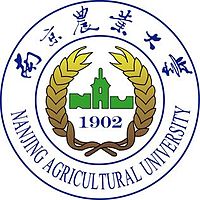Nanjing Agricultural University (NAU) is one of the earliest institutions of higher agricultural education in China and a national key university under the Chinese Ministry of Education. The lineage of Nanjing Agricultural University can be traced back to 1902 and SanjiangNormal School, a teacher training center in Nanjing. In 1952, Nanjing Agricultural Collegewas founded through the merger of the two agricultural faculties belonging to University ofNanking (est. 1914) and National Central University (est. 1928) along with several departments of the Agricultural College of Zhejiang University. In 1984, the college was renamed Nanjing Agricultural University with the approval of the Ministry of Education.
NAU is a 211 Project institution, one of the top 100 universities in China the central government has prioritized for research funding, discipline construction and administrative supervision. NAU is also one of the Innovation Platforms for Outstanding Disciplines listed under the National 985 Excellence Initiative Project. Moreover, a 2012 analysis of research citations by Thomson Reuters Essential Science Indicators found NAU among the top 1% of institutions in the fields of Agricultural Science, Plant & Animal Science and Environment/Ecology.
The main campus of the university is situated in Weigang, in the picturesque eastern part ofNanjing near the UNESCO World Heritage Ming Imperial Tombs and the Sun Yat-sen Mausoleum. NAU also has three satellite campuses: the Puzhen campus is home to theCollege of Engineering, the Zhujiang campus is NAU’s experimental farm, and the Baima campus is part of the National High-Tech Agricultural Valley. The NAU libraries collection holds over two million volumes and more than 10,000 international periodicals.
Building on its century-long history, Nanjing Agricultural University is today pursuing a strategy of developing into one of the best agricultural universities in the world. NAU is committed to a blueprint of promoting leading-edge academics, cultivating innovative and entrepreneurial talents, and emerging as a regional hub for international academic exchange and cooperation.



